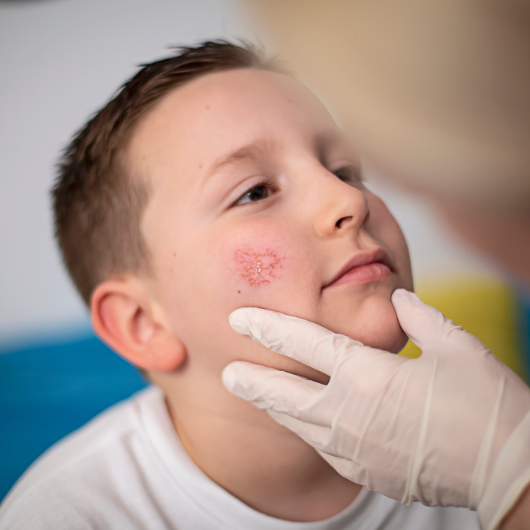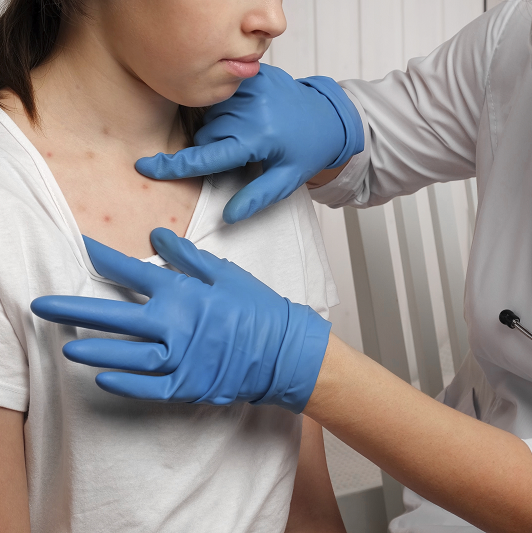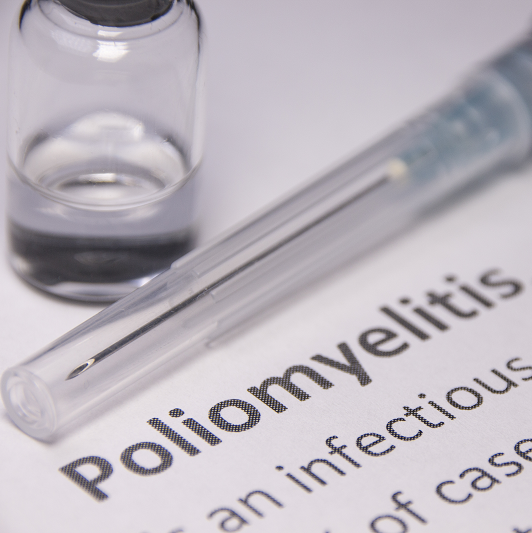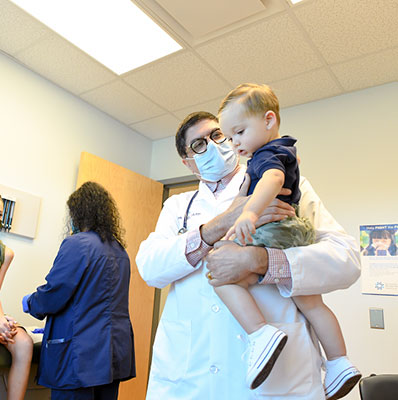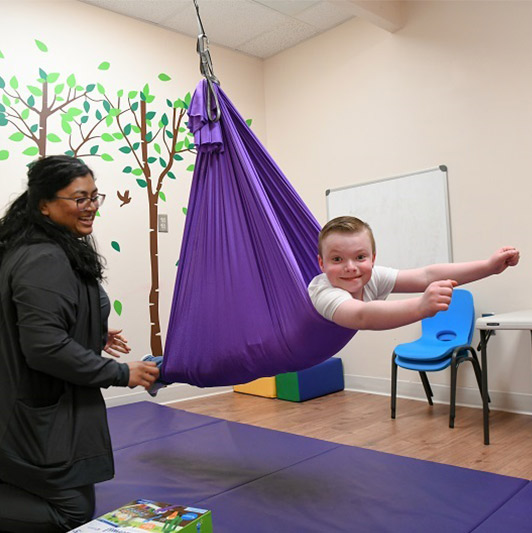The Truth About Vaccines and Autism: Acknowledging Fears, Sharing Facts

July 10, 2025
Stefan Hagmann, M.D., knows the heartbreaking damage childhood infections can do – including measles, which was once eliminated in the U.S. but now is on the rise again. He also knows what the MMR vaccine does: It helps prevent children from becoming dangerously sick with measles, as well as mumps and rubella. It does not, as some parents may worry, cause autism.
Pediatricians and parents share the same goal: keeping kids healthy. So Dr. Hagmann and his colleagues aim to help parents understand the facts around childhood vaccines – including why there’s no connection between vaccines and autism.
As section chief of the Division of Pediatric Infectious Diseases at Joseph M. Sanzari Children’s Hospital, Dr. Hagmann wants parents to have the right tools to make the best health care choices for their child. We asked him – along with Daniel Ruderfer, M.D., chief of the Division of Pediatric Infectious Diseases at K. Hovnanian Children’s Hospital, and Moses F. Olorunnisola, M.D., a pediatrician with Hackensack Meridian Medical Group – to help us sort the facts about vaccines and autism (and other myths) from the fiction.
Myth: MMR Vaccines and Autism Are Connected
Autism spectrum disorder (ASD) – a developmental condition that can affect behavior, communication, learning and other aspects of life – is diagnosed in around 1 in 31 children in the U.S. Anytime a child gets a serious diagnosis such as ASD, Dr. Hagmann acknowledges, it’s human nature for parents to look for possible reasons why. Enter the MMR vaccine.
Coincidental timing
“The myth around MMR vaccines and autism,” says Dr. Olorunnisola, “is more or less a timing thing.”
Dr. Hagmann explains that “the medical community is always working to diagnose autism earlier.” Since pediatricians and parents are more aware of ASD now than they were in the past, they’re catching even mild cases earlier. That’s a good thing, he says, since early intervention is key to treatment.
These days, parents may start to notice signs of ASD and reach out to their pediatrician when their child is around 12 to 18 months old – only a short time after children typically receive their first MMR vaccine (12 to 15 months). Yet just because two things happened within a particular time frame doesn’t mean that one caused the other.
In fact, evidence gathered during the past decade shows that ASD actually begins developing much earlier, while a fetus’ nervous system is forming in the mother’s womb. So the timing simply doesn’t work to connect MMR vaccines and autism.
One fraud
Why, then, does the myth around vaccines and autism persist? Much of the confusion about the MMR vaccine began with a single, fraudulent 1998 study that included only 12 children in London who had developmental delays. Eight were eventually diagnosed with autism.
The 12 children had received the MMR vaccine (as had 90 percent of all kids in England at that time), so the study’s author suggested a connection between the vaccines and autism. But it was revealed later that five of the children were already showing developmental differences before their vaccine.
“The study was full of misinformation,” says Dr. Ruderfer. “The author manipulated the data. He didn’t note the financial incentives he received from lawyers litigating against vaccine companies. He performed unnecessary procedures on children without informed consent. And since then, many people have tried their very hardest to replicate what he said he found, and it hasn’t been done.”
Due to all of those major offenses, the study was eventually retracted. After the same author published another study on vaccines and autism in 2002 that was also found to have severe flaws, he was stripped of his medical license. These studies are now considered one of the most harmful frauds in modern medicine.
Many facts
The truth is that lots of ethical, factual research, including a thorough study published in 2002 of more than half a million Danish children, has shown no difference in the rates of autism in kids who’ve received the MMR vaccine versus those who haven’t, says Dr. Hagmann. For many years, researchers around the world have been able “to show with smart, powerful studies that there is no association between vaccines and autism,” he notes.
Another telling factor? The MMR shot that kids receive today has been used since 1971, combining three vaccines that had been successfully used since the 1960s. Across the nearly 55 years since, and hundreds of millions of doses given worldwide, no link between the vaccines and autism has ever been found.
Myth: There’s Mercury in the MMR Vaccine
Besides the myth around vaccines and autism, another myth parents may have heard focuses on the MMR and other childhood vaccines’ ingredients. The ingredient that tends to cause the most confusion, according to Dr. Olorunnisola, is a preservative – a mercury-containing compound called thimerosal. Despite its proven effectiveness and no evidence of any risk, parental worries about a connection between thimerosal in vaccines and autism led to its removal in 2001 from childhood vaccines that contained it.
But here’s the thing: The MMR vaccine never contained thimerosal in the first place. In fact, most childhood vaccines never did. Vaccines that today are packaged in single-dose vials, where contamination isn’t a concern, don’t need a preservative. Of the routine childhood vaccines now in use, only a few multidose types of influenza vaccine contain thimerosal.
Still, parents’ questions about thimerosal can often lead to a good conversation about the ingredients and safety of the MMR vaccine and childhood vaccines in general, says Dr. Olorunnisola. “With mercury, the type that’s in any vaccines [ethylmercury] is one your body breaks down and is excreted much more rapidly than methylmercury. Therefore, the type of mercury found in vaccines is much less likely to accumulate in the body and cause harm.”
“The mercury that parents are often thinking of [methylmercury, the type found in contaminated fish and shellfish] can indeed cause issues, but that’s not what you’re getting in a vaccine,” Dr. Olorunnisola clarifies. “Being able to have that conversation with parents – ‘Let me help to explain further what you’ve heard or read’ – is useful,” he says, “because the misinformation they’re asking about might be rooted in a tiny piece of truth, so I can help them sort it out.”
Myth: There Are Human Fetal Cells in the MMR Vaccine
“Another thing I hear questions about, whether it’s in the MMR or other vaccines, is fetal cells,” says Dr. Olorunnisola. “To make a vaccine for a virus, you need human cells to grow that virus in.”
For the rubella (the R in MMR), chickenpox and hepatitis A childhood vaccines, those cells still come from two cell lines that were started in the 1960s, from two fetuses that had already been aborted (they were not aborted to create the cell lines). “At the end of the vaccine manufacturing process, the cells that were used to grow the virus are filtered off,” explains Dr. Ruderfer. “The cells are not in the vaccine but were used to make the vaccine, because these 60-year-old cell lines are well-researched and still very efficient at doing that job.”
Global religious leaders have approved the ongoing use of these two cell lines, but still, Dr. Ruderfer understands that it can be a complicated issue for some parents he speaks with. “There’s a lot of nuance,” he says, “even for us as doctors.” He suggests a conversation with the pediatrician about ingredients in the MMR and other childhood vaccines to discuss any questions a parent may have.
Why Myths About Vaccines and Autism (and Other Misinformation) Are Still Circulating
Why has false information about vaccines and autism and other myths been spreading in recent years? The global surge of COVID-19 was a very frightening, confusing and isolating time. So perhaps it’s not surprising that once a vaccine became available, myths, misinformation and conspiracy theories developed alongside it, spreading largely on social media.
Mind-control microchips, fertility loss, altered DNA and more – many of the concerns may have stemmed from worries that the new vaccine was too good to be true. Instead, thankfully, it helped to end millions of now-preventable deaths and serious complications of COVID-19.
Yet for some, the confusion and fear around vaccines held on, expanding to focus attention on long-standing childhood vaccines like MMR and falsely suggesting, again, a link between vaccines and autism.
The Truth About MMR and Other Childhood Vaccines
When it comes to measles, which is especially dangerous for children and so contagious that if one person gets it, up to 9 of 10 other unprotected people exposed to them will also become infected, “you have to think about not only the responsibility you have to yourself and your child, but also to your family and your community,” Dr. Hagmann says. “Who else in your home or around you might be at risk?” That’s especially important at a time when measles cases are on the rise due to lower rates of vaccination.
“I understand that the topic of childhood vaccines creates a lot of emotions,” Dr. Ruderfer says. “But one of my sons was the first child to participate in the COVID-19 vaccine trial – I wouldn’t have done that if I didn’t believe in vaccination.”
His take on MMR and other childhood vaccines has always been: “If you love your kids and you want to do what is long-term best for them, you vaccinate them. Then you have the peace of mind that while you can’t control the future, you’ve given your child the best chance to prevent and overcome an infection.”
Next Steps & Resources:
- Meet our sources: Stefan Hagmann, M.D., MSc, Daniel Ruderfer, M.D. and Moses F. Olorunnisola, M.D.
- To make an appointment and discuss vaccines with a pediatrician near you, call 800-822-8905 or visit our website.
- Learn more about Hackensack Meridian Children’s Health.
- Watch our podcast on Navigating the Noise on Pediatric Vaccines.
The material provided through HealthU is intended to be used as general information only and should not replace the advice of your physician. Always consult your physician for individual care.




